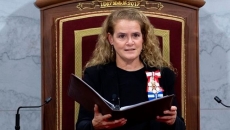Canada and Joe Biden's White House will agree more than they disagree, Prime Minister Justin Trudeau said Friday as he urged people to look past the new U.S. president's decision to kill off the Keystone XL pipeline project.
The two countries still have a great deal in common cause in the Biden era, particularly when it comes to a shared vision of tackling climate change while fuelling economic growth, Trudeau said.
"It's not always going to be perfect alignment with the United States; that's the case with any given president," he told a news conference outside his Rideau Cottage residence.
"In a situation where we are much more aligned — on values, on focus, on the work that needs to be done to give opportunities for everyone while we build a better future — I'm very much looking forward to working with President Biden."
Trudeau was on deck later Friday to be Biden's first phone call with a foreign leader since taking office, and promised to express Canada's frustration with the Presidents Day 1 decision to cancel the pipeline expansion.
And he promised the federal government would be there to support oilpatch workers in Alberta and Saskatchewan who have been hurt by the decision.
But there's little doubt the fight is far from over, particularly if Alberta Premier Jason Kenney has anything to say about it.
"Failing an agreement with the American government, we call on the government of Canada to respond with consequences for this attack on Canada's largest industry," Kenney said Thursday.
"That's not how you treat a friend and ally."
Biden believes a brisk economic recovery doesn't have to come at the expense of the environment, White House press secretary Jen Psaki said Thursday.
"His record shows the American people that he's committed to clean energy jobs, to jobs that are not only good, high-paying jobs, union jobs, but ones that are also good for our environment. He thinks it's possible to do both," Psaki said.
Biden opposed the Keystone XL expansion as vice-president under Barack Obama, who blocked the project in 2015, and as president he still does, she added.
"He had opposed the Keystone pipeline ... and he's been consistent in his view and he was delivering on a promise he made to the American public during the campaign."
Kenney and other champions of the project, including Kirsten Hillman, Canada's ambassador to the U.S., argue it has changed significantly since the Obama administration cancelled it five years ago.
Trudeau held a call with all the premiers Thursday that included a briefing from Hillman, according to a readout from the Prime Minister's Office.
"The prime minister reiterated his disappointment with the decision on Keystone XL, and emphasized that the federal government has engaged with the new administration in support of the project," it said.
A federal official familiar with the call, speaking on condition of anonymity in order to discuss the details, said Kenney and several others urged Trudeau to take a hard line with Biden.
Trudeau, however, insisted Canada had done everything it could to change his mind, and called on the premiers to take the same united, "Team Canada" approach they did with Biden's predecessor.
As word emerged this week of the project's imminent demise, Calgary-based owner TC Energy revealed plans to spend US$1.7 billion on a solar, wind and battery-powered operating system for the pipeline to ensure it achieves net-zero emissions by 2030.
Kenney says Wednesday's decision came "without even giving Canada a chance to communicate," although Hillman insists she has been in near-constant discussions with the Biden team ever since May, when they promised to cancel the project.
Biden's decision has critics in the U.S. Republican party as well: Rep. Kevin McCarthy, the House minority leader, calls it a job-killing "virtue signal" to climate activists.
Trudeau is also likely to voice worries about Biden's Buy American plan to ensure U.S. workers and manufacturers are the primary beneficiaries of his economic recovery strategy.
Biden and Vice-President Kamala Harris were scheduled to receive a briefing later Friday on that recovery effort before the president makes public remarks on their plans.
The phone call with Trudeau, meanwhile, is expected to take place after 5 p.m. ET.





.jpg)
